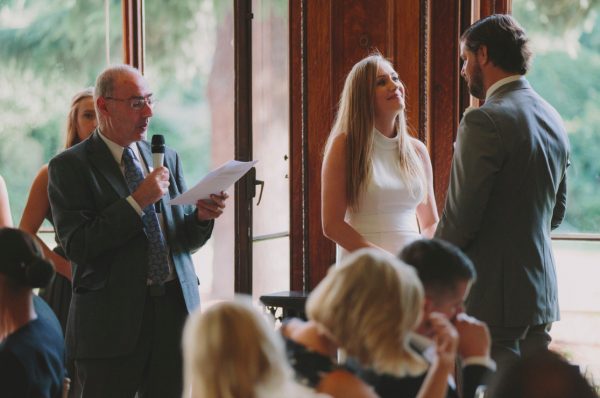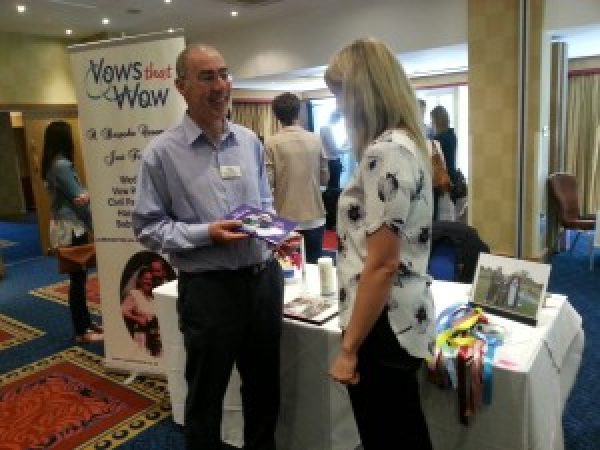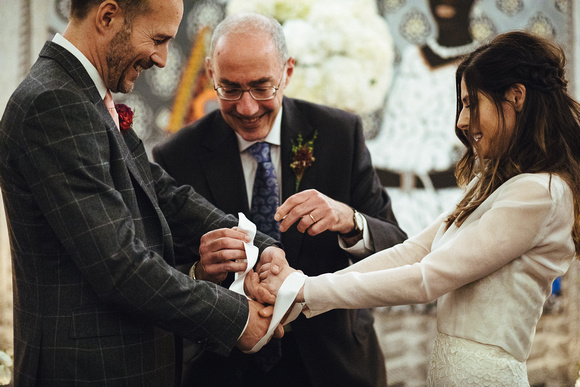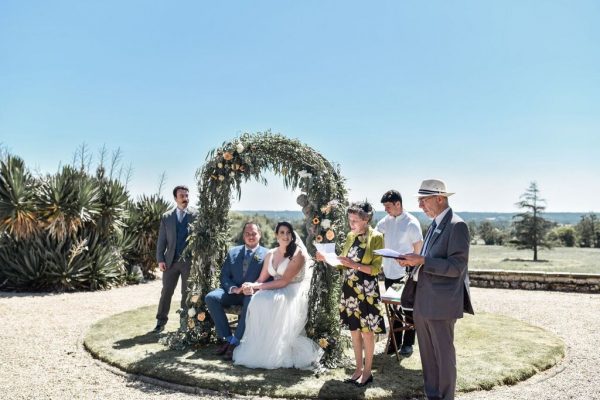
by Michael | Aug 13, 2020 | Blog
Unless you’ve worked with a civil celebrant before, you don’t really know what you’re getting when you engage one. There are plenty of them out there. Of course, they all have their individual personalities and quirks. That means that one celebrant is not going to be the same as another.
One may shine at razzamatazz, while another will be great at atmosphere building. One may prefer formality and gravity; a different one may throw in humour.
What are your requirements? What do you need to look for? How can you be sure of value for money?
As with choosing any supplier, you need to do some research.
You may be able to rely on first-hand testimonials. You may be attracted by someone’s website. You will have a budget that you do not want to exceed.
So how do you actually choose?
One of the pieces of ‘homework’ you should always do is to speak to the potential supplier. Ask the questions you need answering and get a feel for the supplier. Compare (like-for-like, if possible) with a similar provider.
As a celebrant, I know I am not the most expensive out there, but I am dearer than a number of my competitors. I know I “start at the extra mile”, so I justify this easily enough.
There will be some celebrants who don’t offer the same level of service, but who may well charge less. This will attract some clients, and that’s their decision!
Of course, paying ‘loadsa money’ does not necessarily guarantee quality, but there is a fair chance that someone at the higher end of the scale will supply wonderful service.
It may be useful to study a few reviews before you decide. What do clients recognise that they have gained from working with a celebrant? Is that what you’re looking for?
As a minimum, the celebrant should provide the opportunity to create a personalised ceremony that is beautifully delivered on the day. They should work hand-in-hand with you in order to achieve this.
Caution
At the end of the day, you have to settle on what price you are willing to pay, but don’t just jump for the cheapest! Find out how the supplier works and what they offer before deciding.
Michael would love to have a non-obligation call with you, to show you how he can help you achieve your dream ceremony.

by Michael | Jan 6, 2020 | Blog
I have attended around 30 wedding fairs in my time. As a supplier, rather than a potential groom, I might add.
However, I have observed!
Of course, no two fairs will be identical, but there are certain commonalities that are worth noting.
The beetles
There are always people who are uncomfortable at wedding fairs. They avoid eye contact with exhibitors. Like insects, they scuttle round the room as quickly as possible, keeping to the centre of the aisle and doing their best to ignore any attempts from exhibitors to start a conversation.
As a shy person myself, I understand where they are coming from. However, why have they decided to give up an hour or two, if not to get a few ideas? How will they get these ideas, if not by engaging with the stallholder?
Monsters
Stallholders are rarely monsters. Sure, they initiate conversations – and we were all warned not to talk to strangers, weren’t we? But these suppliers are experts in their field. They are worth talking to.
They are not going to compel you to part with cash just because you have spoken with them. They will certainly not threaten you.
They may ask for your e-mail details, say. This will be in return for entry to a prize draw or sending a freebie to you. Even if you supply your details and then decide you don’t want to work with them, GDPR will be on your side. You can always request them to stop corresponding with you.
Angels
What the exhibitors will do is inform and advise you – you may get some really good tips (for free!) from them.
They will be lovely to you! They want your custom, so they are not going to be rude or abrupt. The ideal for them is that you realise that they are out there and offer something you might want and/or need. They want you to like and trust them. They are more likely to turn on a charm offensive. They’ll also want you to be aware of how competent and professional they are in their field.
Moreover, they know that, even if you aren’t going to buy their product or use their service, you might just know somebody else who will, so they aren’t going to have a hissy fit if you declare you’re not interested.
The couples who seem to get the most out of wedding fairs are happy to spend time with each exhibitor (or the majority) and ask plenty of questions. They can gain a picture of whether or not the exhibitor can meet their needs or wants, and whether they are a supplier they would be excited to work with.
If you come across me at a wedding fair, please have a chat. Find out what a civil celebrant can really offer. I’m really not nasty, and – who knows? – you might be impelled to explore personalised ceremonies further.
But if you
don’t want to wait till the next wedding fair, just give me a call or an
e-mail!

by Michael | Sep 23, 2019 | Blog
If you’re
choosing a supplier, you’re going to want to know exactly what they can offer
you. Unless you have first-hand experience of them – or know someone else who
does – you’re batting in the dark to some extent.
You may be
able to get a feel for them from their website and testimonials, and that’s a
good starting-point. In the celebrant world, no two will be exactly the same.
So how do you decide between two (or more) seemingly-similar suppliers?
My
suggestion is that you meet up with (or at least have an online meeting with)
them. You need to prepare a list of questions, and see how the responses
compare.
The last question
The first
question a lot of people pose is “how much?”. Obviously, there’s a budget to
consider, but this should actually be the last question to mull over. Why?
Working with
a celebrant is a very personal thing. You may talk about your private love story
with them. You may be asking them to tie your wrists together in a handfasting.
It stands to reason that you will want to trust them. You’ll need to feel
comfortable with them both personally and as professionals.
The
celebrant who fits the bill may well come at a price. A cheap one may not
listen to your views because they “know best”. Or they may not have great
writing skills. They may not be dedicated or passionate. They may not be able
to present effectively.
Not to say
that nobody at the cheaper end can do the job or that a relatively expensive
celebrant can’t be a disappointment.
But you can
minimise the risk element by doing your homework. If you talk with them, and end
up liking them and feeling that they have experience, passion and the right
skills, then you are well on the way.
So you need
to tell them your picture of your big day. Will their suggestions work for you?
Do you feel excited by the end of the
conversation? Do you want that person to conduct your ceremony in front
of the people who are most important to you?
If so, money
should not really be a limiting factor. That’s not what really counts.
The real first question
So the first
question should be availability.
Other questions
Then, ask
the questions around your vision for the day. Do they respond with flexibility,
or arrogance? Do they understand what you have in mind? Do you like their
ideas? Will they be able to deliver?
What experience
do they have? Can they supply testimonials or references?
How clearly
do they express themselves? How do you think they’ll come across to your guests
on the day?
Do you sense
that they are just doing a job, or will they go the extra mile?
The answers
to most of these questions should become apparent in the course of a chat.
Practicalities
Another
thing to consider is Terms & Conditions. Do they seem professional? What are
the payment terms? Do they suit you? What exactly is included? And, if there
are extras, how clearly are these laid out?
It may be
worth checking if the celebrant belongs to an Association (as that implies at
least reasonable standards). For example, I am a member of the AOIC, and I
follow its Code of Practice.
A celebrant
is no different from any other supplier. You’re paying for a particular
service. You want to be sure that you are getting value for your outlay. You
deserve to know that satisfaction – if not delight – is virtually guaranteed.
Michael has been conducting ceremonies since late 2012, and would love to discuss this further with you. Just give him a call.
Photo: www.lyndseygoddard.com

by Michael | Jul 22, 2019 | Blog
Apparently, one
of the first concerns of a couple is when they can get married.
By that I mean what day of the week or season they can marry in this country. Not the legal age for marriage.
Full religious
And let’s leave full religious weddings out of the mix. Just to say that Christian weddings will usually not take place on Sundays or Jewish ones on Saturdays. They may be possible on certain festivals, and not on others. Better not to get into all that!
Suffice it to say that your best bet is to approach your minister individually!
Register Office
If you’re
solely marrying at a Register Office, you must make an appointment. The two of
you need to go down, along with two witnesses, for the ceremony. This will
normally be on a working day (except on a Bank Holiday).
By
arrangement, the registrars will come out to certain venues, provided certain
criteria are met and extra fees are paid. This will often include weekends.
Such weddings
have to take place between 8 a.m. and 6 p.m.
Alternative Ceremonies
Any other ceremonies can be held at your discretion. If you are using a venue (such as a hotel, castle, stone circle), as long as you meet the venue’s conditions and you pay them (and any other suppliers, not least, the civil celebrant!), you have free choice.
You will
find that a public holiday will be a more expensive time for you, because staff
have to be paid extra. You may also find that certain holidays can cause
problems with guests. You could theoretically hold your wedding on Christmas
Day, but that would create a dilemma for many potential attendees, especially
families. It might also be difficult for venues to recruit staff then, or for
suppliers to come, as there would be no public transport. You might lose out
big time!
If booking
during the summer holidays, give guests plenty of notice (before they book
their holidays!).
Because
Summer is a popular time for weddings, prices can be higher than at
unfashionable times. Similarly, if you book your event for morning or
afternoon, you may be able to get your venue to budge on their price.
Avoid
Valentine’s Day too, if you want to cut costs.
Finally, returning
to the day of the wedding, Friday and, in particular, Saturday tend to be
dearest. Wednesdays, say, may be cheaper, but, if it was a destination wedding,
people would have to take a lot of time off work.
Summing up
There is considerable flexibility (if you do your homework). It is a fallacy that you have to marry at the weekend, although that remains the most popular time.
Take into consideration the issues mentioned above, but feel free to make your own decision. Your big day must be when you want it!




